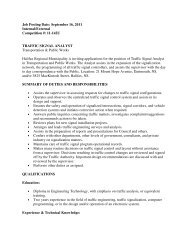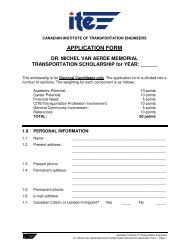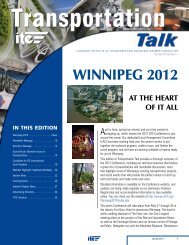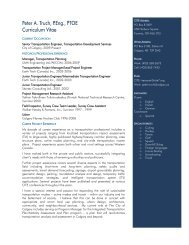Spring 2009 - Canadian Institute of Transportation Engineers
Spring 2009 - Canadian Institute of Transportation Engineers
Spring 2009 - Canadian Institute of Transportation Engineers
Create successful ePaper yourself
Turn your PDF publications into a flip-book with our unique Google optimized e-Paper software.
THE FUTURE OF<br />
<strong>Transportation</strong> Education in Canada<br />
MEMBER’S POLL COMMENTS<br />
As far as I know they produce none. They produce Civil <strong>Engineers</strong><br />
who took a few transportation classes. If you want to be a<br />
<strong>Transportation</strong> Engineer I think you need to go to school in the U.S.<br />
I could be wrong.<br />
----------------------------------<br />
In my opinion, <strong>Canadian</strong> universities are not producing enough<br />
transportation engineers to address industry needs. From my<br />
experiences as a recent graduate, there are many more jobs than<br />
engineers to fill them - not just in transportation engineering. The<br />
market has a strong demand for transportation engineers, and<br />
there are many jobs available.<br />
----------------------------------<br />
<strong>Transportation</strong> Engineering curriculum is being sacrificed at<br />
“notable” universities and no one seems to notice. You can get a<br />
degree in Civil from Queen’s and never take a transpo course.<br />
Ridiculous.<br />
----------------------------------<br />
The answer must be YES since a number <strong>of</strong> public sector entities<br />
(MTO plus several municipalities) are now specifying that traffic<br />
impact studies must be stamped by pr<strong>of</strong>essional engineers. So<br />
there must be an ample supply <strong>of</strong> engineers to prepare and<br />
stamp, as well as review, this sector <strong>of</strong> “transportation<br />
engineering.” If, however, the preparation <strong>of</strong> anything<br />
transportation-related (what’s next, travel demand forecasts?) is<br />
going to require only the seal <strong>of</strong> approval <strong>of</strong> transportation<br />
engineers, then the answer will change to NO.<br />
----------------------------------<br />
As a recent graduate from the University <strong>of</strong> British Columbia, I felt<br />
that transportation courses were lacking for undergraduate<br />
students. The first transportation course available to civil<br />
engineering undergraduates was in third year, second term. By<br />
this time, the program had already exposed students to several<br />
structural-related courses, a geotechnical course, a hydrology<br />
course, and sustainability courses. Furthermore, this was the only<br />
“required” transportation course in the program, compared to the<br />
six or so “required” structural courses. During my time at UBC,<br />
there were only two listed “elective” courses for transportation,<br />
one <strong>of</strong> which was not <strong>of</strong>fered that year due to a pr<strong>of</strong>essor leaving<br />
on sabbatical. Coupled with the fact that civil engineering students<br />
enter the department wanting to go into a structural stream<br />
(echoed in the <strong>Transportation</strong> Talk article), there is not much <strong>of</strong> an<br />
opportunity for students to be exposed to transportation<br />
engineering.<br />
While some <strong>of</strong> the issue rests with the universities themselves,<br />
I also believe that industry could also do more to attract students<br />
into the discipline. I’ve heard on several occasions that<br />
consultants and public agencies alike are in need <strong>of</strong> transportation<br />
pr<strong>of</strong>essionals, but at industry nights and September BBQs, they<br />
are nowhere to be found (or at least not the transportation<br />
department). Well…that’s not true - transportation pr<strong>of</strong>essionals<br />
do come out to the UBC ITE industry night, and it has been well<br />
attended for several years now. However, that is essentially<br />
preaching to the converted. In my opinion, not only do<br />
transportation pr<strong>of</strong>essionals need to come out to the more general<br />
industry nights to attract students, they need to have ongoing<br />
conversations with the universities to help shape the programs so<br />
that new graduates will have the desired skill set to enter the<br />
workforce. The industry needs to act as advocates to the<br />
universities to help build the transportation programs, because<br />
from personal experience, it is hard for a department head to take<br />
students seriously (not to mention undergrad students, and the<br />
relatively low number <strong>of</strong> students who actually want more courses<br />
in transportation engineering).<br />
Having said that, it is positive to see this topic discussed in<br />
<strong>Transportation</strong> Talk. Now having created more awareness <strong>of</strong> the<br />
issue, I hope that changes will be made for the future and that<br />
transportation engineering will be as strong a discipline as the<br />
other fields in civil engineering.<br />
----------------------------------<br />
<strong>Spring</strong> <strong>2009</strong> 7









